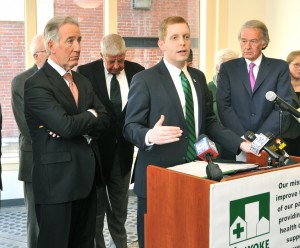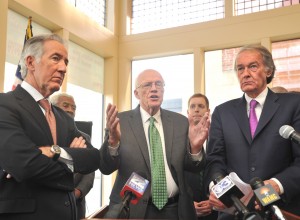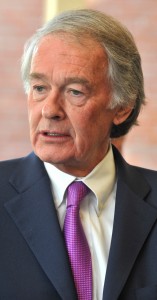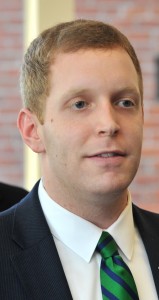
Holyoke Mayor Alex Morse speaks about the heroin issue in his city and the larger area while flanked by U. S. Rep. Richard Neal (D-Springfield) and U.S. Sen. Edward J. Markey (D-Massachusetts) during a news conference Friday to discuss proposed efforts to change the approach to dealing with the problem. (Photo by Carl E. Hartdegen)
HOLYOKE — At a noon press conference Friday, U.S. Senator Edward Markey joined a group of law enforcement officials and legislators, including Congressman Richard Neal and Holyoke Mayor Alex Morse, to discuss the epidemic of heroin and prescription drug abuse in western Massachusetts.
During the conference, held at the Holyoke Health Center, Markey spoke of the crisis that is enveloping the region and of his introduction of the Opioid Overdose Reduction Act Thursday.
Designed to protect individuals who administer lifesaving opioid overdose prevention drugs such as naloxone, better known by the brand name Narcan, Markey is also calling for the expansion of drug treatments to prevent overdose deaths from opioids, and for the mobilization of federal funding to expand detox treatments.

Hampden County Sheriff Michael Ashe is flanked by U. S. Rep. Richard Neal (D-Springfield) and U.S. Sen. Edward Markey (D-Massachusetts, as he speaks about the changes he has seen in issues involving heroin during a news conference in Holyoke Friday after a meeting to discuss proposed changes in the effort to fight the scourge. (Photo By Carl E. Hartdegen)
“I’m dedicating a lot of my time and energy to this issue, as is Richie (Neal). This is a cutting edge issue in our society today,” Markey said, before acknowledging the efforts of doctors, nurses, and volunteers at Holyoke Health Center as being “on the frontlines of this fight.”
“You are hometown heroes to all of us, but heroes need help,” he said.
Markey referred to heroin as an “equal opportunity destroyer of lives.”
“Drug overdose deaths fueled by prescription now surpass homicides and traffic crashes in number of injury deaths in Massachusetts and in America,” he said. “Approximately one hundred Americans will die from a drug overdose today. This is what an epidemic looks like.”
Markey referenced 21 overdose deaths that have occurred in Berkshire, Franklin, and Hampshire Counties in the past four months alone, along with the massive 140 patient caseload being heaped on the Holyoke Health Center, which enrolls one new patient a week for opioid addiction.
“This meteoric rise in addiction to heroin and prescription drugs is nothing less than catostrophic,” he said. “There is an epidemic that has hit the communities of western Massachusetts. It strikes without regard to age, race, gender, or socioeconomic status. It doesn’t care about your political party, your job, or your family ties.”
Markey was sure to dish praise back to Washington as well, making reference to President Barack Obama’s budget, which proposed an increase of $26 million to address prescription drug use, abuse, and overdose, but said there is more work to be done.
“I’m calling for a three-pronged approach to beat back the heroin and prescription drug epidemic,” Markey said, listing preventing overdose deaths, expanding access to multiple treatment methods, and modernizing treatment and prevention as the three directions he’d like to see efforts take.
“To prevent, we must expand Narcan programs for first-responders and bystanders,” he said. “We know that Narcan saves lives, we have to make sure that we put the Narcan in the hands of those who can save the lives of citizens of our state, of western Massachusetts.”
He added that police and fire departments in several communities statewide have already implemented programs that have been credited with saving the lives of more than 300 overdose victims since 2010, and that most Narcan programs nationwide are still funded by donations and local government funds.
“Once we reduce the overdose problem, we need to expand access to modern prevention treatment,” Markey continued. “We need to be sure that critical detox and treatment are available when needed and are easier to access. As (Hampshire County) DA Sullivan said ‘There shouldn’t be a bed in New Bedford or Cape Cod for someone from Holyoke.’ We have to find a way of making sure it’s available.”
Markey suggested the development of applications which can be downloaded on mobile devices to help find available treatment and detox facilities for addicts.
“We need to modernize our addiction treatment systems by expanding new treatments as they become available,” he said. “When new treatments are approved, we need to invest in bringing them to scale for the right people in the right settings as soon as possible.”
Hampden County Sheriff Michael Ashe was also on hand, and spoke of how this latest drug explosion has ravaged western Mass.
“We’re all here because we’ve seen the scourge of this disease in our society,” he said. “When I started, I had 89 staff and 150 inmates. In 2009, I went to over 800 staff and 2,200 inmates because we thought we could build ourselves out of the issue.”
Ashe added that the epidemic has elevated itself to this point in “a very inexpensive way”, as bags of heroin have become available for as little as five dollars on the streets of cities throughout the region.
Ashe, who has stated he will not seek reelection in the fall, said he is excited for new strategies being proposed by legislators and that his department has “their helmet and cleats on” ready to tackle the issue.
“What we need is leadership, because we’ve all felt this way — citizens, parents, police, schools, et cetera — and we all have to come together,” he said. “We’re looking at this in a more sophisticated way, looking at substance abuse as a public health issue and we need an enormous amount of help in these areas.”
Following the conference, western Mass. Democrats were able to shed further light on how the opioid epidemic is affecting their home communities.
“When it comes down to it, anything that raises awareness is a good thing,” said State Senator Benjamin B. Downing (D-Pittsfield). “We’ve had more overdose deaths in Massachusetts since the start of the Iraq War than we lost in the war itself.”
Downing, whose rural district contains all of Berkshire County, as well as portions of Franklin, Hampshire, and the Hampden County hilltowns of Blandford, Chester and Huntington, said that more access and resources are the keys to stopping the crisis.
“There’s a lot of work to do, but raising awareness is first and foremost,” he said.
“(Opioids) are no longer an inner city problem. They’re spreading out to the suburbs and rural areas, too,” said State Rep. Brian Ashe (D-Longmeadow). “People discriminate, drugs don’t. I hope that today is part of a paradigm shift.”
Ashe, who shares no relation to the longtime Sheriff, whom he worked under from 1993 to 2008 as a correctional officer and then as a counselor, stated that overcoming addiction shouldn’t be thought of as a matter of will power.
“If people could quit that easy, they would,” he said, adding that education is critical. “You can’t legislate problems away. If kids aren’t taught the dangers when they’re young, it’s too late when they get to high school.”
Perhaps no one at the HHC yesterday better understands the state of the epidemic than Holyoke Mayor Alex Morse, whose city, roughly the same size as Westfield at 40,000 residents, has become the epicenter of the epidemic.
“It’s an important issue, and today raised awareness,” said Morse. “We need to listen to professionals and focus on preventing substance abuse before it happens. The message today is that it’s not just an urban problem — it’s suburban, it’s rural, it’s spreading out. The data we’ve been given, it’s becoming more apparent.”
Morse agreed with the focal message of Sen. Markey’s visit, that more funding is the key to stopping the ominous march of drug abuse in western Mass.
“Budgeting shows what we value,” he said. “The goal should be allocating less money in prisons, and more on prevention.”




